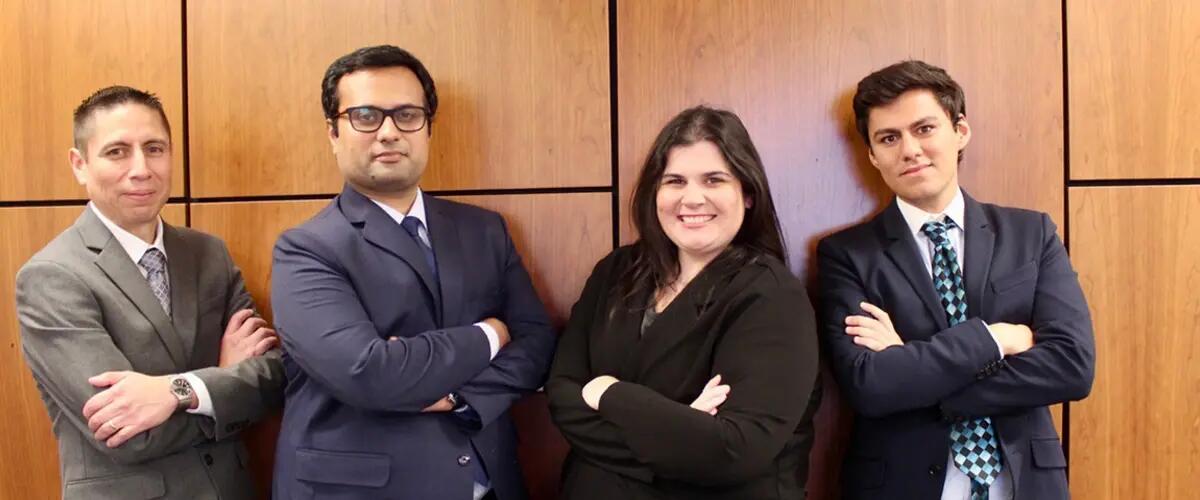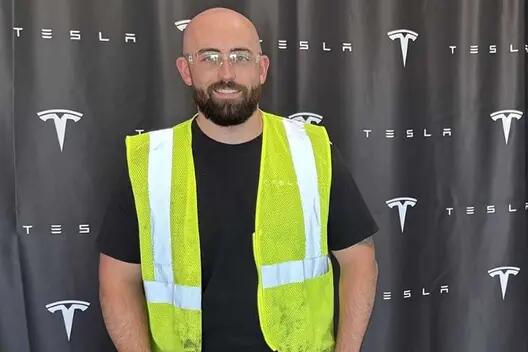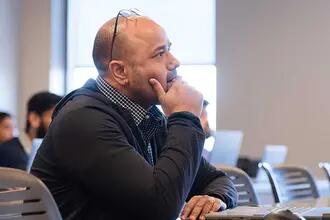
Full-Time MBA students, Jose Quevedo, Devasheesh Melkani, Alexandra DeMarco and Joseph Russomanno.
First-year MBA students focused on strategy, innovative ideas to win first place in Florida Southern Case Competition
Among the challenges a group of Rutgers Full-Time MBA students faced as they prepared for the Florida Southern Case Competition, was juggling the research, the focus and strategy required for their presentation with the need to study for mid-term exams.
They had already met and started working within Microsoft Teams, sharing information they were collecting about Truist Bank, the company at the center of the case and trends in retail banking, including potential applications of artificial intelligence.
The case competition challenged the students to develop a strategy for how Truist – a bank created from the merger of BB&T and SunTrust banks – would shed redundancies, retain customers, utilize branches and modernize its retail banking services.
“We took the four themes and looked for solutions touching on all of them – digital applications, branches, employees and customers,” said Jose Quevedo who helped to keep the team organized and focused. “That may have differentiated our team. It took more effort, but it paid off.”
In the midst of their preparation for the competition, mid-terms arrived. The four first-year MBA students pivoted to focus on their studies and then immediately returned to preparing for the competition. “We were a bit exhausted,” Quevedo admitted, “but we kept going. We wanted to win.”
For Quevedo and his team mates – Alexandra DeMarco, Devasheesh Melkani and Joseph Russomanno – their first case competition demonstrated their knowledge but also their collective resilience and motivation to achieve the goal.
The team won first place in a competition with students from 12 other schools, including California State, Indiana State and George Mason University. Rutgers MBA came out ahead of second-place winner University of Alabama and Florida Southern College, which won the third place prize. Other participating schools: Bloomsburg, Florida State and University of Southern Florida. Three schools were represented by two teams.
Quevedo said the judges – all executives and managers from Truist – told the Rutgers students they had created a list of 10 ideas from the student presentations. The ideas were the ones they thought were most relevant to Truist. The top four ideas came from the Rutgers team, the judges told the students.
“We nailed it when it came to the strategy,” Quevedo said.
While all four students contributed to the research, helped to develop the strategy and participated in the presentation, they also brought individual strengths. Quevedo, a chemical engineer who spent 14 years at Shell Global Solutions in the Netherlands, said he was the motivator and organizer. Melkani, who worked in banking, brought a knowledge of the industry. Russomanno brought enviable public speaking skills to the group, and DeMarco brought an enthusiasm that kept the team going. “Her energy,” Quevedo said, “was quite important.”
From the start, the team was determined to win. “My objective was to reach one of the top three places,” Quevedo said. Another motivator: The team's coach, Jerry Flynn, an assistant professor of professional practice in management and global business, referred to them from Day 1 as "the winning team."
Flynn described the students as a diverse group of individuals who quickly formed an effective team. “Based on the feedback from the Truist team of judges, it became clear that each unique perspective on Team RBS contributed something special to the winning effort,” he said.
The diversity, Flynn explained, included age, gender, nationality as well as industry and academic experience. “This group,” he said, “really demonstrated the power and potential of diverse teams.”
Press: For all media inquiries see our Media Kit


